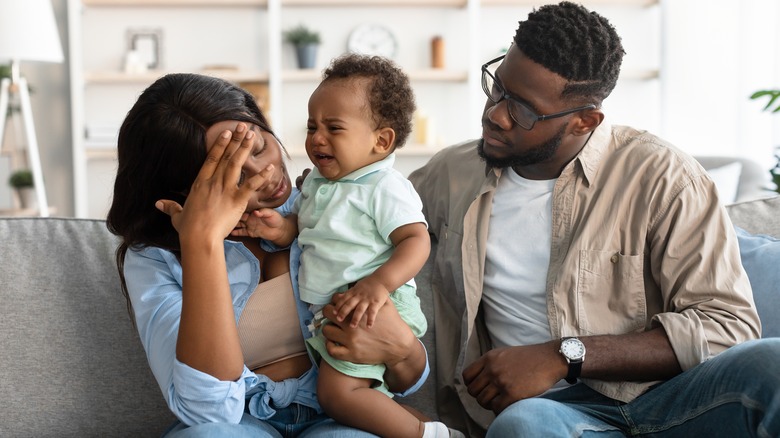How Migraines Affect Men And Women Differently
Migraines, also known as acute recurrent headaches, can last up to 48 hours, causing moderate to severe head pain. Often, 2-4 episodes occur monthly (per Cleveland Clinic). They are biologically based, with two types of migraines affecting the brain: migraines with an aura, and migraines without an aura.
Dr. Andrew Charles, the director of the Headache Research and Treatment Program in the UCLA Department of Neurology, shares with NPR that migraines are a "spectacular neuro-physiological event" consisting of bursts of electrical activity that travel throughout the brain, moving toward the sensation control centers. This combination creates a variety of symptoms including sensitivity to light or sound, nausea, dizziness, loss of vision, difficulty speaking, vomiting, and more, according to Healthline.
However, this health condition shows up differently in men and women. During childhood, migraine attacks are more common in boys, but once girls hit puberty, they are more likely to be affected. This trajectory only increases as girls reach womanhood, with migraines being three times more probable in women than men. Statistically, one in every four women will experience a migraine (per NPR).
Why migraines are more common in women
Antonio Ferrer-Montiel, a professor of molecular biology and biochemistry at Miguel Hernandez University in Spain, points out to WebMD that sex hormones play a role in migraines. Hormonal fluctuation can be the source of migraine attacks in many women, according to neurologist Jan Lewis Brandes (via NPR). Hormone fluctuations are associated with the menstrual cycle, which explains the rise in migraine attacks after girls get their first periods. More research is needed to determine which hormone is the main offender, but many believe it to be estrogen, per WebMD.
"After menopause, when the levels of estrogen remain low — they don't fall — most women improve. Estrogen falls increase the excitability of the brain cortex. Migraine is a condition where the cerebral cortex is more 'excitable,' often genetically, so that is one reason why," says Mark W. Green, professor of anesthesiology and neurology, and the director of the Center of Headache and Pain Medicine at Mount Sinai's Icahn School of Medicine (per Washington Post). While research for treatments is underway, aging and menopause in women seem to guarantee some relief.


